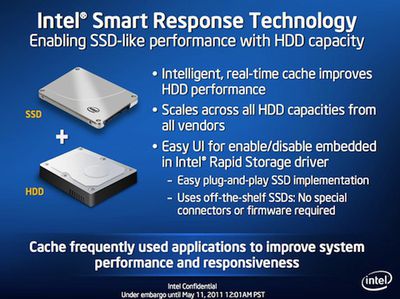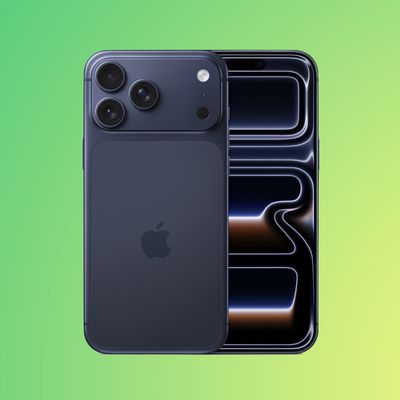
Last week, we noted that Apple's new iMac models utilize Intel's latest Z68 chipset, a component that Intel had yet to even publicly introduce at the time of the iMac's debut. The chipset has been highly anticipated for its ability to support SSD caching, a software technology that pairs a small solid state drive (SSD) with a conventional hard drive to significantly improve performance in a manner virtually invisible to the user.
While Apple's new Z68-based iMac does not currently support SSD caching, now officially known as Smart Response Technology (SRT), it actually goes further in offering the option of a secondary 240 GB SSD to directly host the user's operating system and applications, leaving the conventional hard drive for media and other data. But with reports just prior to the most recent MacBook Pro refresh in late February incorrectly claiming that the updated models would offer the option of a small secondary SSD to essentially perform SRT functionality, there has been significant interest in the possibility of Apple adopting Intel's solution.
With Intel's embargo on Z68 information having lifted earlier today, AnandTech has posted a thorough review of the chipset and the SSD caching feature. On a basic level, the report notes that Z68 is the chipset Intel should have launched for its Sandy Bridge platform earlier this year, overcoming a number of limitations related to overclocking and graphics options.
Intel's Z68 should have been the one and only high end launch chipset offered with Sandy Bridge. It enables all of the configurations we could possibly want with Sandy Bridge and does so without making any sacrifices. Users should be able to overclock their CPU and use integrated graphics if they'd like. While Z68 gives us pretty much exactly what we asked for, it is troubling that we even had to ask for it in the first place.
But the most anticipated feature of Z68 is its support for Intel's SRT SSD caching, and AnandTech takes a close look at the technology. With support currently available for Windows 7, it allows users to dedicate up to 64 GB of SSD space for caching purposes.
With Intel's RST 10.5 drivers and a spare SSD installed (from any manufacturer) you can choose to use up to 64GB of the SSD as a cache for all accesses to the hard drive. Any space above 64GB is left untouched for you to use as a separate drive letter.
Intel limited the maximum cache size to 64GB as it saw little benefit in internal tests to making the cache larger than that. Admittedly after a certain size you're better off just keeping your frequently used applications on the SSD itself and manually storing everything else on a hard drive.
That latter scenario is of course what Apple has chosen to do in the iMac with the secondary 256 GB SSD, although the company could certainly seek to utilize SRT on future systems as an alternative to the $600 price premium the larger SSD requires.
For its part, Intel has released a new "SSD 311" drive checking in at 20 GB and codenamed "Larson Creek". The SSD 311 is specifically designed as a caching SSD for Z68, utilizing high-performance and long-lasting single-level cell (SLC) flash memory and expected to be priced at around $110.
AnandTech goes on to explain the difference between the more secure "enhanced" and faster "maximized" modes for Intel's SSD caching and offers a number of benchmarks for booting and application launching. Overall, SSD caching offers much of the performance improvement of a full SSD solution, but at a fraction of the cost. Consistency is an issue, however, as the technology obviously requires that information be cached in the first place before speed enhancements can be seen. This limits speed improvements for application installation and first-time runs of applications, but frequently-used tasks quickly see significant speed increases.
Intel's Smart Response Technology (SRT) is an interesting addition to the mix. For starters, it's not going to make your high end SSD obsolete. You'll still get better overall performance by grabbing a large (80 - 160GB+) SSD, putting your OS + applications on it, and manually moving all of your large media files to a separate hard drive. What SRT does offer however is a stepping stone to a full blown SSD + HDD setup and a solution that doesn't require end user management. You don't get the same performance as a large dedicated SSD, but you can turn any hard drive into a much higher performing storage device. Paired with a 20GB SLC SSD cache, I could turn a 4-year-old 1TB hard drive into something that was 41% faster than a VelociRaptor.
It of course remains to be seen if Apple will even adopt SSD caching technology as an alternative to pricier standard SSD options, but the company's embracing of the Z68 chipset at least opens the door to the possibility at some point down the road.




















